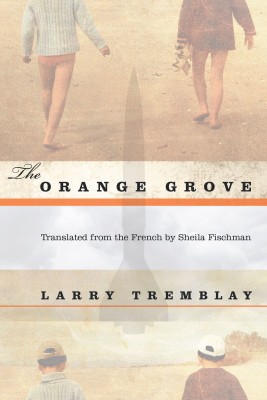A playwright in Larry Tremblay’s The Orange Grove, a tertiary character representing the author himself, asks, “Why should he not have the right, as an artist, to talk about war?” – even if he hasn’t been exposed to it. The novel argues that a writer has permission not only to discuss war he has no intimate relationship with, but also to enter into racial and religious conversations beyond his scope as a white, North American writer. While the use of imagination is paramount to the success of art, the reader is left pondering Tremblay’s own question throughout the text.
The Orange Grove is a poetic novel that revels stunningly in its use of language and metaphor – wonderfully apparent in Sheila Fischman’s deft translation – to tell the story of twin brothers from a war-ravaged unnamed Middle Eastern country. Following the bombing death of their grandparents, the boys’ family is charged with a life altering decision about an act of vengeance. As they confront their decision, Tremblay explores issues of religion, race, war, family, and morality in a lyrical text that immerses the reader in a difficult conversation, while unravelling a larger discussion about the limits and rights of imagination.
The Orange Grove presents itself as “a tragic fable about the absurd logic of terrorism.” And if its story was set in a universe other than ours, the question Tremblay asks about the permission to appropriate the voices of another culture might have been dismissed as simply part of its fabulism. But in introducing “America” to the narrative, Tremblay situates his novel in our world, and in doing so he demands that the reader consider whether or not such cultural appropriation is suitable.

The Orange Grove
Larry Tremblay
Translated by Sheila Fischmann
Biblioasis
$17.95
paper
176pp
9781771960366
Tremblay was asked by the National Post Reading Society about what experiences permitted such authenticity. He replied, “I have fortunately never lived through any events in my life that resemble those written about in The Orange Grove. I have never experienced war. I am a writer who puts forward the power of imagination. A writer, for me, is, before all, someone who imagines.” But that’s not enough. As Rankine and Loffreda argue, “to say, as a white writer, that I have a right to write about whoever I want, including writing from the point of view of characters of color – that I have a right of access and that my creativity and artistry is harmed if I am told I cannot do so – is to make a mistake.”
The Orange Grove is a poetic exploration that is troubled by a question it asks of itself: Is imagination an open license? It is the task of artists to find interesting ways to disseminate their creativity without assuming knowledge or intimacy, while respecting both the limits of imagination and the realities of permission. mRb






0 Comments